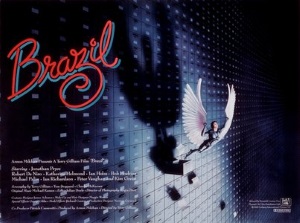
I knew going in that despite its title this film had nothing to do with Brazil and that it was a science-fiction movie with a good dose of director Terry Gilliam’s unique brand of fantasy. What I didn’t know was that it is basically a re-imagining of 1984. You can’t fail to notice what’s going on when the perfect on-screen version of jack booted thugs, down to the square jaws and British accents, show up, and that’s when I started to really have fun with this movie.
Every film like this needs an everyman character the audience can empathize with and in this case it is Sam Lowry, played by Jonathan Pryce. A low-level functionary who is more competent than most but is wholly without ambition and lives in complete conformity with the rules, Lowry is to all outward appearances the ideal cog in the machine. Yet he has a recurring dream about saving a damsel in distress. In it, he is a winged angel wielding a mighty sword and he soars across a brilliant landscape far removed from the colorless grime of the real world.
It’s a ridiculous fantasy of course, the kind of exaggerated caricature that only a child could indulge in. But then the world Lowry lives in is so hopeless and empty of meaning that you can understand his need. Unlike the surveillance state of 1984, the central horror in Brazil is bureaucracy and its complete indifference to people as individuals. It’s so in-grained into the inhabitants of this world that not only do they feel nothing for those wronged by the rules, they don’t even bat an eye when violence erupts around them simply because it’s not their job to deal with it.
What makes Brazil such a delight to watch is all the ways that Gilliam uses to bring this vision of dystopia to life. There are the big, obvious stuff like the retro-futuristic nature of its technology, the prevalence of ducts as a visual motif, replacing I think the telescreens of 1984, the use of paper as a literal antagonist and so forth. But there also all kinds of little details, such as how everyone gives everyone else the exact same Christmas present, how the music and the fashions seem like they’re from the 1940s, even how Lowry taking on added responsibility results in him needing to wear a grander suit. One of my favorite bits is how the faces of babies appear on some of the monsters in Lowry’s fantasy. It’s creepy but it’s just one more horrific image among many others. But near the end of the film, you realize what the baby faces must refer to and it’s a powerful emotional jolt just as the film reaches its climax.
The visual impact of these scenes are actually heightened by the fact that they are all done with practical effects and not CGI. No one could ever forget the sight of the plastic surgeon stretching and twisting at the face of Lowry’s mother as if it were a giant piece of chewing gum. With computer effects, it could have looked smoothly animated. Yet the sight of it feels so squicky precisely because it looks so cheap and so fake. For the same reasons, the obvious artificiality and even cheesiness of Lowry’s fantasy, with the ludicrous wings and gleaming chestplate, actually makes those scenes more charming.
Gilliam’s inventiveness and genius extends beyond the visual realm. I can’t overstate how delicious I find the idea that this world’s public enemy number one is a janitor who fixes things without going through the proper channels and doing the paperwork. I also liked how Lowry really isn’t a hero at all. For him, the girl Jill is an escapist fantasy and that’s all he really wants, to escape. He never seems to feel any sympathy for Buttle’s family, he never condemns the system nor seeks to join the nameless rebels. It is only when the system turns against him that he struggles against it but even so he never steps out of his assigned role and see the true horror of the entire world. It’s a dramatic statement of just how deep the brainwashing goes.
No doubt many people are ticked off by its ending and are obsessed with puzzling out just how much of what we see is real. Roger Ebert apparently didn’t like it because he found it too hard to follow. But I think Brazil gets away with it because no matter how you interpret it and even if you conclude that Lowry is insane since the very beginning, everything still hangs together and makes sense. For me at least, this is a masterful work that I think everyone should watch if only for its visuals.
2 thoughts on “Brazil (1985)”